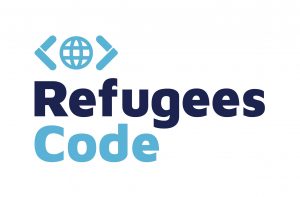 Refugees Code, a coding program under the umbrella of Madrid For Refugees, has completed its rebranding to promote the growth of its software development program for migrants.
Refugees Code, a coding program under the umbrella of Madrid For Refugees, has completed its rebranding to promote the growth of its software development program for migrants.
The biggest aspect of the rebranding is the name change to Refugees Code. With this new name and logo, Refugees Code hopes to bring more awareness to its projects and further the education of asylum seekers in Madrid. The brand and logo were made by Helena Faria, a graphic designer in Brazil who volunteered her time to help Refugees Code expand on this exciting new chapter.
“We’re thrilled about Refugees Code’s new and revamped identity and are looking forward to seeing the program grow,” said Christina Samson, President of Madrid for Refugees.
“Madrid For Refugees works to help refugees, asylum seekers, and migrants thrive in the local community through social integration and strengthening employability. One of the ways we do this is through Refugees Code, which equips them with the technical and professional skills needed to find opportunities as a software developer and join a modern tech team in today’s digital world.”
For the past two years, Refugees Code has helped refugees in Madrid gain knowledge about the tech world and expand their career opportunities.
“With the Refugees Code, we have been able to learn how to code without having any prior knowledge. The teachers are well-prepared and willing to go the extra mile to help us. The course has given me an opportunity to grow professionally and continue my career; I graduated as a computer engineer in Nicaragua and by taking this course I have the opportunity to continue my profession in this country, an opportunity that not all people have when they arrive. I would recommend this course to others without a doubt.” said Harving, a Refugees Code alum from Nicaragua.
If you’re interested in learning more about Refugees Code and volunteering with us, you can find out more here.
About Refugees Code

Refugees Code is a course on Front-End development and Web Design that aims to boost the work and social integration of asylum seekers in their new country: Spain.
The course consists of weekly lessons, exercises and projects. Materials are shared with students in advance and every week they are required to read, watch videos, and process the content along with related exercises. Lessons are twice a week where doubts are solved and exercises reviewed. Students are also encouraged to ask questions to teachers through Slack. In addition, there is a set of complementary masterclasses to support the course and provide the students with wider knowledge on the methodologies used in the tech field.
The course is taught by volunteer teachers that are highly qualified professionals in the field and are well integrated in the tech scene in Spain and Madrid.
Follow Refugees Code: Twitter / Instagram / Facebook / LinkedIn



